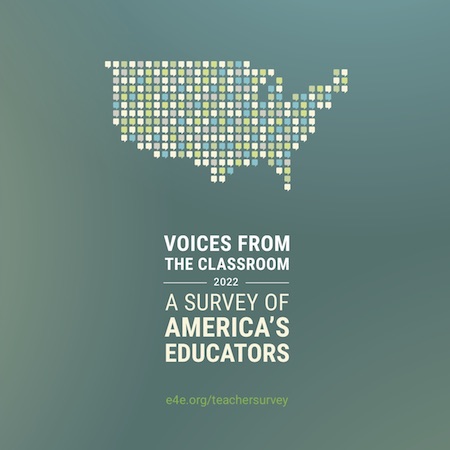 A new survey by Educators and Excellence and the Education Trust offers evidence that teachers of color tend to have different views about the problems facing American education than their White counterparts. In many questions throughout the survey, the sentiments of the BIPOC (Black, Indigenous, and people of color) sample varied in profound and important ways, particularly in questions about how to recruit and retain educators.
A new survey by Educators and Excellence and the Education Trust offers evidence that teachers of color tend to have different views about the problems facing American education than their White counterparts. In many questions throughout the survey, the sentiments of the BIPOC (Black, Indigenous, and people of color) sample varied in profound and important ways, particularly in questions about how to recruit and retain educators.
More than 50 percent of the students in public school classrooms across the United States identify as people of color, while only 20 percent of their teachers do. And while the share of BIPOC educators has increased over the past several decades, it hasn’t kept pace with the increasing share of students of color. The gap between the two has grown since the 1980s, according to the report.
The authors state that “people of color are less likely than their white counterparts to enroll in bachelor’s degree programs, to enroll specifically in education preparation programs, and to complete that program if they do enroll. Because people of color graduate with more student debt than white graduates do, some researchers hypothesize that the low pay makes teaching an “impractical choice” for BIPOC graduates, thus driving them away from the profession.”
Here are some of the revealing responses from the survey:
* Some 86 percent of all teachers surveyed said they are likely to remain teachers throughout their entire careers. Only 52 percent of BIPOC teachers agreed.
* Only 6 percent of all teachers said that school districts that offer housing support would be an effective strategy in recruiting and retaining teachers. But more than a third of BIPOC teachers think housing support would play a major role in recruiting and retaining teachers.
* More than three quarters of all teachers said higher pay would help recruitment and retention. Only 22 percent of BIPOC teachers agreed.
* Only 7 percent of all teachers said more leadership development programs would help recruit and retain teachers. But more than 40 percent of BIPOC teachers said such programs would be welcome.
The authors note, too, that “last-hired, first-fired” seniority rules are impacting teacher diversity in districts where enrollment declines have taken place. Often teachers of color hired under recent diversity programs have less seniority and are the first to be let go when enrollments decline.
The report recommends that states can improve retention of teachers of color by investing in programming that provides ongoing support and growth opportunities and improves poor working conditions that disproportionately impact teachers of color.
The full report, Voices from the Classroom 2022: A Survey of America’s Educators, may be downloaded here.










